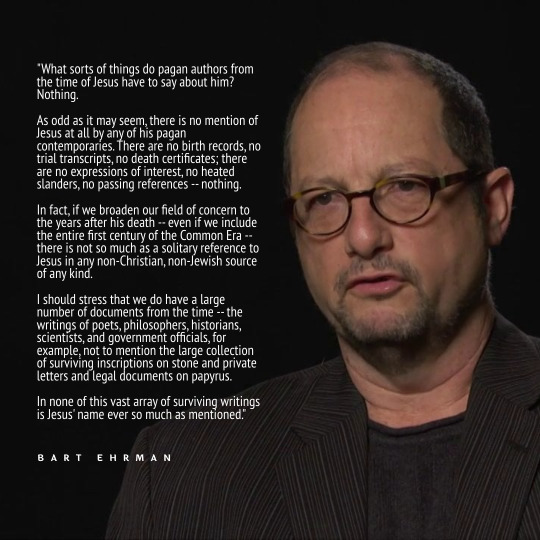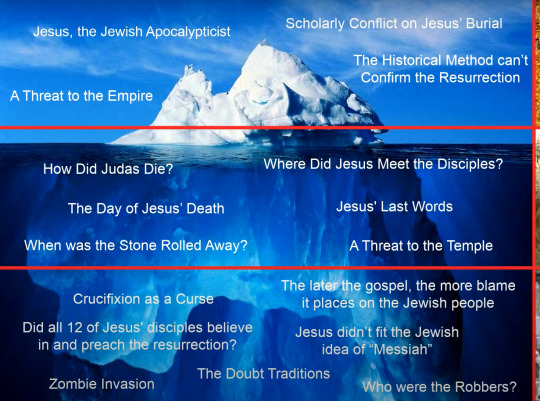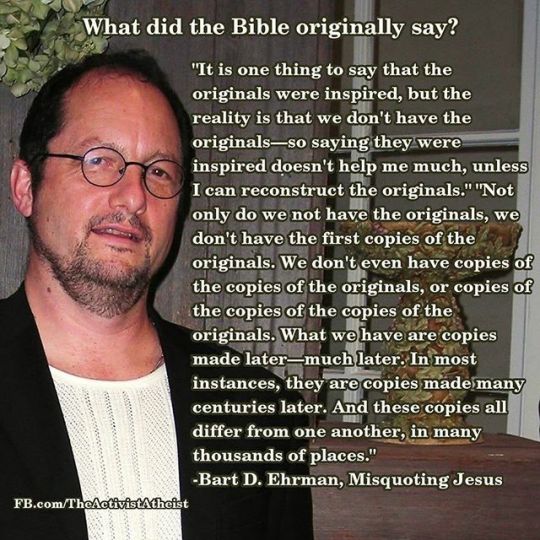#bart ehrman
Text

"What sorts of things do pagan authors from the time of Jesus have to say about him? Nothing.
As odd as it may seem, there is no mention of Jesus at all by any of his pagan contemporaries. There are no birth records, no trial transcripts, no death certificates; there are no expressions of interest, no heated slanders, no passing references -- nothing.
In fact, if we broaden our field of concern to the years after his death -- even if we include the entire first century of the Common Era -- there is not so much as a solitary reference to Jesus in any non-Christian, non-Jewish source of any kind.
I should stress that we do have a large number of documents from the time -- the writings of poets, philosophers, historians, scientists, and government officials, for example, not to mention the large collection of surviving inscriptions on stone and private letters and legal documents on papyrus.
In none of this vast array of surviving writings is Jesus' name ever so much as mentioned."
-- Bart Ehrman
How can believers claim to have "found Jesus" when nobody in history has been able to?
#Bart Ehrman#christianity#jesus christ#myth of jesus#religion#no evidence#no evidence of jesus#religion is a mental illness
88 notes
·
View notes
Note
Has the concept of what evangelical Christians call “Hell” changed over the course of history? Like has it always been known in history as a burning inferno where everyone who has sinned goes, or was it interpreted differently in the past? Did what we know as hell even exist to Christians in the past?
Dr. Bart D. Ehrman, an academic scholar who specializes in this kind of thing, has a book about this and videos on it on YouTube! I recommend looking into them.
youtube
34 notes
·
View notes
Text
Continuing my reading of Jesus, Interrupted by Bart Ehrman, I'm on chapter two now where he's discussing contradictions in the Bible. He's not presenting an exhaustive list, but rather ones that "in the opinion of a large number of historical critics, cannot be reconciled without doing real violence to the text."
I'm excited to have some specific examples because as a Christian I would have this concern thrown at me every now and then by nonbelievers I had conversations with. "The Bible is full of contradictions!" they would say and I would ask for one to be named. And every single time no one would be able to give me an actual contradiction, which of course leaves the point at a dead end.
First up on Ehrman's list:
Mark and John say that Jesus died on different days
Mark, the earliest gospel, says that Jesus was crucified at nine in the morning on Passover (Mark 15:25). John has Jesus crucified around noon on the day of preparation for Passover (John 19:14) which is a day before. It is still the day of preparation when the Roman soldiers find Jesus dead (John 19:31-34).
For clarity, the day of preparation ended Friday night as the Sabbath begins at sundown on Friday. Meaning that Mark has Jesus crucified on Saturday morning and John has Jesus crucified Friday afternoon.
Ehrman posits that since John was written later, it's likely that the author changed the time of death to make a theological point: Jesus is the Lamb of God. John is the only gospel to give Jesus the title of Lamb of God. Jesus dying on the day of preparation for Passover means he's dying with all the lambs being ritualistically sacrificed as the Jews remember passover. The timing drives home the notion that Jesus is dying as a sacrifice so that others may be spared.
In my opinion, what we are left with at minimum is the certainty of irreconcilable differences between the gospel accounts that leave the door wide open for being able to doubt their accurate accounting of events. The impact of this could be pretty severe, when you believe that the Bible is completely inerrant with no inaccuracies or contradictions. If I was still a Christian, it would give me a lot to think about.
#exvangelical#ex christian#ex fundamentalist#deconstruction#ex fundie#deconstructing christianity#jesus interrupted#contradictions in the bible#bart ehrman#biblical contradictions
25 notes
·
View notes
Text
i remember when hitchens died, people wondered if anyone would replace him among the four horsemen of new atheism. dawkins, dennett, and harris have sorta receded from relevance, but bart ehrman seems to be the new point man, and he's a direct scholarly attack on bad apologetics and popular misconceptions about jesus and the bible.
9 notes
·
View notes
Text
Atheits who get degrees in theology and Christian history or whatever are so interesting like girl why are hyper fixating on that 😭
#so be clear i have nothing against it#it's just funny#and i have no idea why they do it#alex o'connor#bart ehrman
6 notes
·
View notes
Text
Helping Joe Rogan Know the Truth

by James White | Some folks were kind enough to link me to examples of Joe Rogan's repeat common mythology about how the Bible was collected, the canon, Constantine, etc., so I took the time today to deal with those issues, as well as respond to a number of claims made in one clip as Rogan interviewed Lawrence Krauss, a well known atheist and former professor at ASU. I think Joe Rogan would benefit greatly from viewing my 2009 debate with Bart Ehrman, found here. https://youtu.be/5K-AOfj1Axg
4 notes
·
View notes
Text
Invention of “hell”


2 notes
·
View notes
Text
NT Wright on Bart Ehrman
youtube
2 notes
·
View notes
Text

The Da Vinci Code Versus The Gospels
By Eli Kittim 🎓
Bart Ehrman was once quoted as saying: “If Jesus did not exist, you would think his brother would know it.” This is an amusing anecdote that I’d like to use as a springboard for this short essay to try to show that it’s impossible to separate literary characters from the literature in which they are found. For example, when Ehrman says, “If Jesus did not exist, you would think his brother would know it,” his comment presupposes that James is a real historical figure. But how can we affirm the historicity of a literary character offhand when the so-called “history” of this character is solely based on, and intimately intertwined with, the literary New Testament structures? And if these literary structures are not historical, what then? The fact that the gospels were written anonymously, and that there were no eyewitnesses and no firsthand accounts, and that the events in Jesus’ life were, for the most part, borrowed from the Old Testament, seems to suggest that they were written in the literary genre known as theological fiction. After all, the gospels read like Broadway plays!
Let me give you an analogy. Dan Brown writes novels. All his novels, just like the gospels, contain some historical places, figures, and events. But the stories, in and of themselves, are completely fictional. So, Ehrman’s strawman argument is tantamount to saying that if we want to examine the historicity of Professor Robert Langdon——who is supposedly a Harvard University professor of history of art and symbology——we’ll have to focus on his relationship with Sophie Neveu, a cryptologist with the French Judicial Police, and the female protagonist of the book. Ehrman’s earlier anecdote would be akin to saying: “if Robert Langdon did not exist, you would think Sophie would know it.”
But we wouldn’t know about Robert Langdon if it wasn’t for The Da Vinci Code. You can’t separate the character Robert Langdon from The Da Vinci Code and present him independently of it because he’s a character within that book. Therefore, his historicity or lack thereof depends entirely on how we view The Da Vinci Code. If The Da Vinci Code turns out to be a novel (which in fact it is), then how can we possibly ask historians to give us their professional opinions about him? It’s like asking historians to give us a historical assessment of bugs bunny? Was he real? So, as you can see, it’s all based on the literary structure of The Da Vinci Code, which turns out to be a novel!
By comparison, the historicity of Jesus depends entirely on how we view the literary structure of the gospel literature. Although modern critical scholars view the gospels as theological documents, they, nevertheless, believe that they contain a historic core or nucleus. They also think that we have evidence of an oral tradition. We do not! There are no eyewitnesses and no firsthand accounts. All we have about the life and times of Jesus are the gospel narratives, which were composed approximately 40 to 70 years after the purported events by anonymous Greek authors who never met Jesus. And they seem to be works of theological fiction. So where is the historical evidence that these events actually happened? We have to believe they happened because the gospel characters tell us so? It’s tantamount to saying that the events in The Da Vinci Code actually happened because Robert Langdon says so. But if the story is theological, so are its characters. Thus, the motto of the story is: don’t get caught up in the characters. The message is much more important! As for those who look to Josephus’ Antiquities for confirmation, unfortunately——due to the obvious interpolations——it cannot be considered authentic. Not to mention that Josephus presumably would have been acquainted with the gospel stories, most of which were disseminated decades earlier.
Don’t get me wrong. I’m not trying to downplay the seriousness of the gospel message. I’m simply trying to clarify it. The gospels are inspired, but they were never meant to be taken literally. I’m also a believer and I have a high view of scripture. The message of Christ is real. But when will the Jesus-story play out is not something the gospels can address. Only the epistles give us the real Jesus!
#the da vinci code#ευαγγέλια#bart ehrman#the gospels#literarycharacters#literarystructures#literature#elikittim#novel#ΟΚώδικαςΝταΒίντσι#robert langdon#SophieNeveu#NewTestamentliterature#epistles#historical jesus#Genrecriticism#literarygenre#HistoricalJesusStudies#dan brown#the little book of revelation#ελικιτίμ#τομικροβιβλιοτηςαποκαλυψης#Bibleexegesis#historical fiction#ek#fictional characters#literary analysis#theologicalfiction#theJesusprophecy#biblical criticism
1 note
·
View note
Text
Someone just offered to send me five of Bart Ehrman's books for free.
I have accepted.
There will be blog posts linked here.
For those who don't know, he's a scholar on the New Testament, historical Jesus, and the development of Christianity. And an agnostic atheist, who irritates both Christians and atheists. Of which I am neither. So, obviously...
Yeah. There's gonna be some blog posts on my actual website.
4 notes
·
View notes
Link
Trust me, you haven’t LIVED until you’ve read about the walking, talking cross.

2 notes
·
View notes
Photo

What did the Bible originally say?
"It is one thing to say that the originals were inspired, but the reality is that we don't have the originals - so saying they were inspired doesn't help me much, unless I can reconstruct the originals."
"Not only do we not have the originals, we don't have the first copies of the originals. We don't even have copies of the copies of the originals, or copies of the copies of the copies of the originals. What we have are copies made later - much later. In most instances, they are copies made many centuries later. And these copies all differ from one another, in many thousands of places."
-- Bart D. Ehrman, Misquoting Jesus
#Bart D. Ehrman#Bart Ehrman#Misquoting Jesus#christianity#jesus christ#bible#bible study#origin of the bible#anonymous authors#copies of copies#bible forgeries#forgeries#religion#word of god#the word of god#inspired word of god#religion is a mental illness
139 notes
·
View notes
Text
#Judaism#Christianity#greek philosophy#breath life soul#breath#life#soul#podcast#Misquoting Jesus#Misquoting Jesus podcast#Bart Ehrman#Dr. Bart Ehrman#beliefs over time
0 notes
Text
I'm working my way through Jesus, Interrupted by Bart Ehrman which so far has been very accurate to its subtitle of "revealing the hidden contradictions in the Bible (and why we don't know about them.)"
I'm only on Chapter 2 so far but something that I'm struck by is how Ehrman, who is himself an apostate and claims to be agnostic in the text, says that these contradictions and this historical analytical approach to the Bible he was taught in seminary don't mean a person's faith has to end. Not only does he say that he lived for years as a practicing Christian after facing these problems in the Bible, but the vast majority of his scholarly classmates still hold to some form of Christianity. He goes to great lengths to make it plain that pastors who've been to seminary -- which is required for many American pastors -- they were taught this stuff and shouldn't be learning much if any new information from his book. Essentially his view seems to be that the Bible having contractions doesn't have to be faith shattering but it should change how we look at the Bible.
I've seen so many people make Ehrman out as someone trying to take people away from Christianity, but that doesn't seem to be his purpose at all. I'm only familiar with a handful of YouTube appearances he's done on channels I'm subscribed to and now 12% of this one book, so maybe his motives are different in other works of his, but it's hard to imagine now with what I've read and seen so far.
I'm very intrigued to learn more about what he has to say and am looking forward to the rest of the book.
5 notes
·
View notes
Text
Bart Ehrman is gonna get a time machine one of these days only to find out epiousion was the first century version of shagadelic or bussin'
0 notes